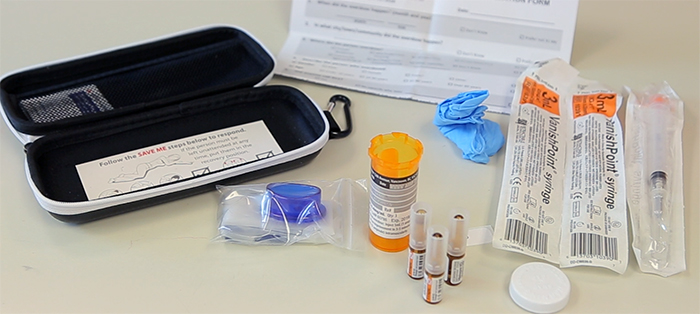With Prince George seeing 47 of the 115 illicit drug deaths in Northern Health in 2020, overdose awareness is becoming increasingly important in the community.
Additionally, the North has the highest illicit drug death rate per 100,000 people at 24.7, with Northern paramedics responding to 999 Overdose calls in 2020.
Nancy Dhaliwal, Regional Nursing Lead of Harm Reduction at Northern Health advises all PG residents to grab a Narcan kit and get training no matter what lifestyle they live.
“Substance use expands across all ethnic origins, every single income, anyone, there’s no group that isn’t affected,” explained Dhaliwal.
However, some groups of illicit drug users tend to be more secretive about usage, as it could impact their job, marriage or social status.
“In those cases, they might be a little harder to reach, they might need more privacy and discretion when getting a Narcan kit but every group has their own issues,” she noted.
According to Dhaliwal, on-again-off-again opioids users have a particularly high risk because their tolerance often goes down, unbeknownst to them.
“If they are clean for a while or incarcerated or for whatever reason have stopped using it, they are at a very high risk of OD-ing,” she explained.
Leann Varney, Education Manager at Positive Living North, says awareness of the Good Samaritan Act is one of the key factors in saving the life of someone OD-ing.
“The biggest thing people don’t realize is 911 is a really valuable tool, and the Good Samaritan’s Act protects people with simple possession of an illicit substance calling 911,” explained Varney.
She says awareness of the law is imperative because getting first responders involved can be a life or death decision.
“Knowing the signs of a couple of different kinds of overdoses is important too because the ones we are seeing in the BC Coroner’s Report are due to the Opioid crisis, and a depressant overdose but we also see people going through stimulant overdoses,” Varney said.
Fever and hyperactivity are common signs of stimulant overdose, whereas unconsciousness and difficulty breathing is commonly a sign of depressant overdose.
Varney also stressed the importance of carrying Naloxone (AKA: Narcan), as it is the drug is the only medication publically available and that helps counteract the effects of opioid overdoses.
The medication is completely free and available at many drugstores and pharmacies across the province since the BC Take Home Naloxone Program (BCTHN) was launched in 2012.
“We need to realize that it can happen to anybody and being prepared can save lives,” she stated, “and getting Narcan training is like putting on a seatbelt, you don’t expect an accident to happen but you’re ready if it does.”
Naloxone works by blocking the effects of opioids such as Heroin, Fentanyl and Oxycodone and can help restore normal breathing to someone who has had their breathing impacted by opioid use.
Narcan training teaches carriers how to use the medication, which is administered through a nasal spray or by injection, and how to respond to an overdose.
According to BCCDC Harm Reduction Services, Naloxone doesn’t help stimulant overdoses (Ritalin, Cocaine, MDMA, etc), but advises using it anyways if in doubt.
There are 43 sites in Prince George that offers free Naloxone, and Positive Living North is just one of the sites in town to offer Narcan training.
For a list of locations in Prince George offering Narcan, click here, for online Narcan training click here (10 minute course) and for Narcan Training sites across BC, click here.
Something going on in the Prince George area you think people should know about?
Send us a news tip by emailing [email protected].






